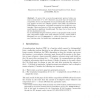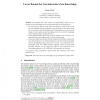37 search results - page 4 / 8 » Public-Key Cryptography from Different Assumptions |
EUROCRYPT
2006
Springer
13 years 11 months ago
2006
Springer
To prove that a secure key-agreement protocol exists one must at least show P = NP. Moreover any proof that the sequential composition of two non-adaptively secure pseudorandom fun...
TCC
2007
Springer
14 years 1 months ago
2007
Springer
Abstract. We establish new lower bounds and impossibility results for noninteractive zero-knowledge proofs and arguments with set-up assumptions. – For the common random string m...
ASIACRYPT
2011
Springer
12 years 7 months ago
2011
Springer
A fundamental question in cryptography deals with understanding the role that randomness plays in cryptographic protocols and to what extent it is necessary. One particular line o...
EUROCRYPT
2009
Springer
14 years 8 months ago
2009
Springer
A group key agreement (GKA) protocol allows a set of users to establish a common secret via open networks. Observing that a major goal of GKAs for most applications is to establish...
ISCI
2010
13 years 4 months ago
2010
Key agreement (KA) allows two or more users to negotiate a secret session key among them over an open network. Authenticated key agreement (AKA) is a KA protocol enhanced to preve...


